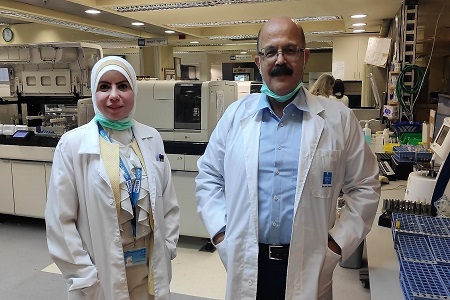
Researchers around the world have been puzzled by a deadly COVID-19 complication that affects 30 percent of patients: the formation of large and small blood clots that create lethal blockages in the patient’s lungs, kidneys, heart, and brain. Prof. Abd Higazi, head of the Hadassah Medical Organization’s Department of Clinical Biochemistry and Division of Laboratories, has identified the mechanism that causes these clots.
Prof. Higazi and international colleagues published a seminal paper in the leading medical journal Blood about their discovery that alpha-defensin, a peptide (an amino-acid chain) speeds up the creation of blood clots and prevents their disintegration. This finding is crucial in understanding what is happening to COVID-19 patients because existing anticoagulant drugs don’t impact alpha-defensin.
“We took blood samples from patients in Hadassah’s COVID-19 Outbreak department,” relates Prof. Higazi, “and found a high concentration of alpha-defensin.” The sicker the patient was, the researchers found, the higher the concentration of this peptide.
Prof. Higazi and lab manager Suhair Abdeen are working on a new way to dissolve the blood clots. They are testing colchicine, an oral medication used for gout, and Familial Mediterranean fever. It has succeeded in reducing alpha-defensin levels and blood clots in mice, and they are awaiting approval to begin human trials.
Prof. Higazi believes if the drug reduces blood clots in COVID-19 patients, it will vastly reduce the number of patients needing respirators. “These patients have numerous blood clots in their lungs, preventing normative blood flow,” he explains.
In addition, he says, “We can give the drug to those with mild symptoms to prevent the development of blood clots.”
